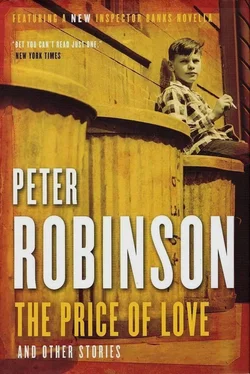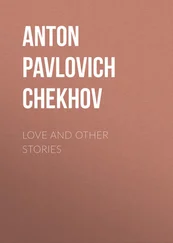On a Saturday morning, the building site was deserted; concrete mixers sat idle and quiet, and the thick sheets of polythene covering pallets of bricks or boards flapped in the wind. It was another grand autumn morning: sunshine, bright blue sky and a cool wind to make everything look and feel fresh. Banks checked his watch. It was after nine o’clock, and he was surprised he had slept so long and so deeply; he couldn’t remember having any dreams at all. He listened for sounds of life from downstairs and thought he could hear talking on the radio and dishes rattling in the sink. They were up.
Desperate for tea or coffee, Banks dressed quickly and made his way downstairs. In the living room, his father looked up from his paper and grunted, “Morning, son.”
“Morning, Dad,” Banks replied, glancing out of the window to make sure his car was still there. It was. His father’s newspaper rustled back into position, and the local radio station, according to the DJ, was about to play a request for “Memories Are Made of This” by Val Doonican, for Mrs. Patricia Gaitskell, of 43 Wisteria Drive, Stamford. Jesus, thought Banks, he could have been caught in a time warp while he slept, back to the B-side of 1967. Perhaps that was why he had felt so disoriented the minute he awoke?
He walked through to the kitchen where his mother, washing the breakfast dishes, gave him a cursory glance and said, “Well, you’ve decided to get up at last, have you?” It was exactly what she used to say when he was a teenager and liked to lie in bed most of the morning. The only thing that saved him from seriously doubting his sanity was the little television on the kitchen table showing a breakfast program. That hadn’t been there all those years ago, nor had breakfast television.
Banks made some comment about having had a long drive and put on the kettle. “Want a cup of tea?” he asked his mother.
“No, thanks. We had ours ages ago.”
“Well, you could have another.”
She gave him a withering look, and he busied himself looking for the tea bags, telling himself that his parents really weren’t being especially nasty to him. They had their routine; it just took a little getting used to.
“They’re where they’ve always been,” his mother told him.
That didn’t help much, as he couldn’t remember where they’d always been. A terra-cotta jar in the cupboard with TEA engraved on the front looked promising, but it turned out to be empty. Beside it, however, Banks found a jar of instant coffee. Might as well, he thought. As long as you convince yourself it’s a different drink, not really coffee at all, then it doesn’t taste too bad. The kettle boiled and Banks made himself a cup of instant coffee. Specks of undissolved powder floated on the surface no matter how much he stirred it.
“Don’t you want any breakfast?” his mother asked, drying her hands on her pinafore. “We got some Sugar Puffs in for you specially. You always used to like Sugar Puffs.”
When I was about twelve, thought Banks. “I’ll give it a miss this morning,” he said. “Maybe tomorrow.”
He wandered into the living room again, his mother not far behind. Val Doonican had given way to the Searchers singing “Someday We’re Gonna Love Again.” An improvement, Banks thought. Funny how the Searchers were exactly the kind of “pop rubbish” his parents dismissed thirty-five years ago, but now they were as acceptable as Val Doonican.
Banks needed a newspaper to complete his morning ritual. His father was still buried deep in the Daily Mail, which, being a Labour man, he only read so he could find things to complain about. The Mail wasn’t Banks’s kind of paper anyway. No real meat on its bones. Especially on the weekend. He needed something with a bit more writing and fewer pictures, like the Independent or the Guardian.
“I’m off to the newsagent’s for a paper,” he announced. “Anything I can get for you?”
“You’ll be lucky if they’ve got any left at this time,” his mother said. His father just grunted.
Banks took their responses as a no and set off. In the house next door, the upstairs windows were all open and music thudded out. It definitely wasn’t Val Doonican or the Searchers; more like Nine Inch Nails or Metallica. Banks studied the house. There were no curtains on the windows, and the front door was wide open. As he was looking, a scruffy couple walked out on to the overgrown path. They looked like Fred and Rosemary West on acid. The man’s eyes, in particular, reminded Banks of the opening of Vertigo.
“Morning,” said Banks. “Lovely day, isn’t it?”
They looked at him as if he were from Mars — or as if they were on it — so he shrugged and walked down to the newsagent’s across the main road. The short strip of shops there, set back from the road by a stretch of tarmac, had gone through dozens of changes over the years. When he first moved to the estate, Banks remembered, there had been a fish and chip shop, a ladies’ hairdresser, a butcher’s, a greengrocer’s and a launderette; now there was a video rental shop, a takeaway pizza and tandoori place called Caesar’s Taj Mahal, a mini-mart and a unisex hair salon. The only constants were the fish and chip shop, which now sold takeaway Chinese food, too, Banks noticed; and Walker’s, the newsagent’s.
Banks waited to cross the busy road. On the other side, lower down from the shops, stood the remains of the old ball-bearing factory. The gates were chained and padlocked shut and it was surrounded by high wire mesh fencing with barbed wire on top, the windows beyond covered by rusty grilles. Despite these security precautions, most of them were broken anyway, and the front of the blackened brick building was covered in colorful graffiti.
Banks remembered when the place was in production, lorries coming and going, factory whistle blowing and crowds of workers waiting at the bus stop. A lot of them were young women, or girls scarcely out of school, and he had a crush on one of them. Called Mandy by her friends, she used to stand at the bus stop smoking, a faraway look in her eyes, scarf done up like a turban on her head. She had pale smooth skin and lips like Julie Christie, whom Banks had gone to see in Darling with a couple of school friends because she did a nude scene in it. They had only been fourteen or fifteen at the time, but the bored woman in the ticket box at the local fleapit hardly even looked at them before issuing their one and threepennies. The nude scene was wonderful, but he didn’t understand much about the rest of the film; it didn’t make the same sense as Billy Liar did for him when he saw it only a few months later. Escaping a boring environment was something he could easily relate to.
One day, Mandy started wearing an engagement ring, and a few weeks later she no longer stood at the bus stop with the others, and he never saw her again. He spent ages in his room moping, and even a few years later, when he bought Beggars Banquet and listened to “Factory Girl,” he thought of her.
Banks went into the newsagent’s. Mrs. Walker moved much more slowly now, and the joints on her left hand were swollen. Arthritis by the looks of it. There was still a small pile of Independents under the magazine rack, so Banks picked one up and took it to the counter.
“You’re the Banks lad back again, aren’t you?” she said.
“That’s me,” said Banks.
“I thought so. My body might be falling to pieces but my mind’s still all right. Haven’t seen you since that business in the summer. How are you doing?”
“Fine, thanks. I see you’re still soldiering on.”
“I’ll be here till I drop.”
“I’m surprised you can manage all by yourself.”
Читать дальше












